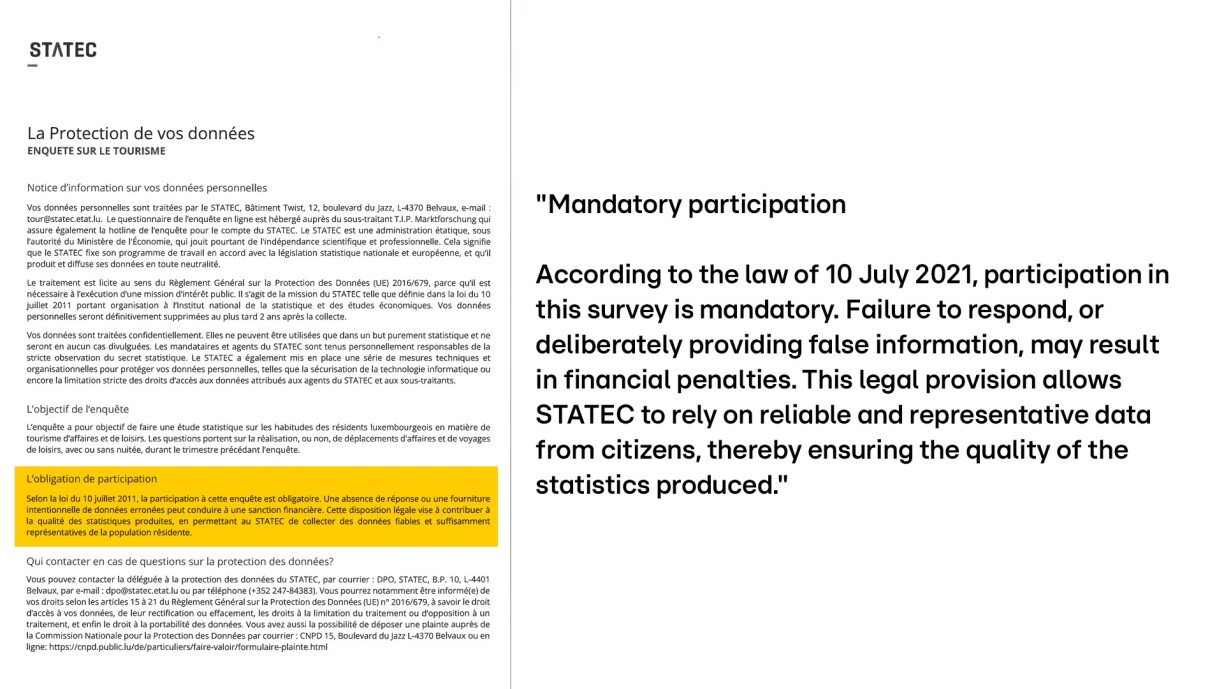
The National Institute of Statistics and Economic Studies (STATEC) regularly carries out surveys in Luxembourg, contacting selected individuals to take part. Non-respondents first receive a reminder by post, along with login details for the survey or alternative ways to get in touch with STATEC.
The letter also includes a leaflet outlining data protection measures, divided into several sections. One of these is titled Mandatory participation. But is participation truly compulsory? And what happens if someone refuses?

The law of 10 July 2011 concerns the organisation of STATEC. Article 13 states that all administrations, municipalities, state establishments and all persons, whether physical or legal, must provide the information requested by STATEC within the prescribed deadline.
“Public administrations, municipalities and public establishments, as well as all natural or legal persons, are required to provide the statistical information requested by STATEC within the time limits set in its request.”
As STATEC clarifies, everyone must participate in all their surveys, unless these are explicitly marked as “optional”. One example of such an optional survey was the Enquête “Technologies de l’information et de la communication – TIC”, which targeted young people.
“Unless explicitly stated as optional, the obligation to respond applies to any request for information from STATEC based on the national statistical programme or on European and international statistical programmes.”
Anyone who does not participate in the survey, or deliberately provides false information, faces a fine of between 251 and 2,500 euros. Even after paying the fine, one must still answer the questions from the statistics office, according to Article 15 of the law of 10 July 2011.
According to the Ministry of the Economy, whose then-minister Jeannot Krecké co-signed the 2011 law: “The missions of STATEC are to provide public and private decision-makers as well as citizens with high-quality public statistical information. To present a representative and reliable picture of society, it is important that the population participates in Statec surveys. Only in this way can it be guaranteed that the published data are representative and relevant.”
STATEC distinguishes between surveys for individuals and those for businesses. For private households, there are about 15 a year: “The frequency varies from quarterly (for example, Tourism Survey), yearly (for example, Household Budget, Revenues and Living Conditions of Households, Internet Usage) to the 10-year rhythm of the Census.” For businesses, there are about 33 a year.
Sample sizes are often determined at the European level “to ensure an acceptable level of statistical accuracy. The size therefore varies from one survey to another.” The smallest target around 1,000 persons or households, the largest up to 5,000.
All persons listed in the national register can be randomly selected to take part in a survey. It is also possible for someone to be selected more than once. “Due to the small size of our country, the probability of being selected is higher than in a larger country”, says STATEC.
There is no special legal remedy to avoid participating in a STATEC survey, even if one finds the questions too personal. “In that case, common law applies, and the person concerned can file an appeal with the competent authority”, explains the ministry, while clarifying that STATEC limits its questions to information necessary for reliable statistics. “The questionnaire is also often determined by European regulations, so that in such cases identical questions are asked by statistical offices throughout the EU, ensuring that the answers are comparable.”
This was similarly noted by the competent minister in response to a 2021 parliamentary question from Sven Clement. The Pirate Party MP wanted to know if the law of 10 July 2011 conflicted with the “Right to privacy”. The ministry at the time stated that this law outweighed the obligation to participate in STATEC surveys. “The short law of 11 August 1982 is mainly aimed at preventing and punishing wiretapping, recordings, surveillance and violations of correspondence. These activities have nothing to do with the work of a statistical office.”
Upon request, STATEC clarifies that legal proceedings are only the very last resort in a long process to get individuals or businesses to participate. “This includes at least two written reminders, registered letters, telephone calls, home visits in the case of personal surveys, as well as suggestions to help people or companies.”
The Ministry of the Economy specifies that in cases of non-cooperation, the police draw up a report, which is then sent to the prosecutor’s office. “STATEC has never filed a complaint against a private individual who failed to comply with their obligation to participate in a survey. However, STATEC has already filed a complaint against a company that refused to respond to one of the surveys.” This also appears in a parliamentary question from Marc Goergen in February 2025, which was answered by Economy Minister Lex Delles.
As many people as possible must take part in STATEC surveys for the office to produce high-quality statistics. “Only in this way can it be guaranteed that the published data are representative and reliable. Participation in STATEC surveys is therefore mandatory,” states the statistics office.
To process high-quality statistical information, the national statistics office depends on as many people as possible taking part in its surveys. This is why the law of 10 July 2011 stipulates that participation is mandatory for citizens, administrations and businesses. Those who refuse may face a complaint and a fine, although for STATEC this remains only a last resort.